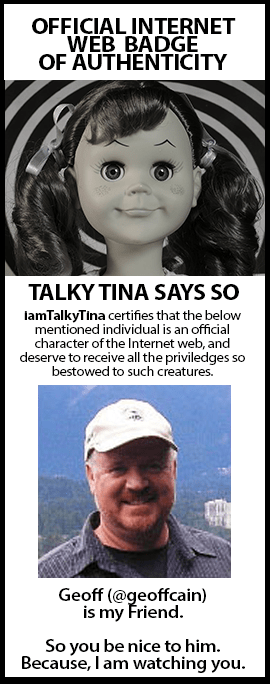I am reading the Stanford Report on AI. This statement from the report brought back on all the things I had read about AI growing up: “Contrary to the more fantastic predictions for AI in the popular press, the Study Panel found no cause for concern that AI is an imminent threat to humankind. No machines with self-sustaining long-term goals and intent have been developed, nor are they likely to be developed in the near future.” With that said, I love hearing about breakthroughs in artificial intelligence. They are usually accompanied by breathless timelines, e.g., this break-through means that within 10 years, robots will take the place of x workers, or even more dire predictions, like Elon Musk’s, for instance – declaring AI as an “existential threat to humanity.” The AI is not the threat, it is our misperception of the nature of technology and consciousness. If we think that machines can make decisions, and we rely on those “decisions,” you can bet we will be extinct in 100 years. We will be destroyed not by the machines but by our misplacement of power and trust to those machines. The folks programming AI and those employing it have no idea what intelligence really means. It is not playing chess. It is not driving a car. One has only to drive down any metropolitan freeway on any weekday between 4 and 7 PM to know that intelligence has nothing to do with driving. I know about this first hand because my Android phone and my wife’s iPhone have both sent us dangerously down one way streets. Does that make the technology evil? Evil implies some sort of intention. Maybe the phone planned that or intended to do so? These two things I think the phone can’t do, planning and intention, why do we think they can drive?
Intelligence is not even making music because making music requires self-reflection, inspiration, a life-long relationship with music and all of the experience and history that would imply. I will believe that computers can really make music when a robot drops out of college, moves back into his mother’s (creators?) garage to become a drummer. But modern computers do not have that kind of agency or motivation. No computer has ever leaned back in a chair and said “I am restless. I am going to the park to play chess.” No computer has ever felt compelled to create.
The science of cognition is still in its infancy. How do you go about making something “artificial” when you don’t know what you are making an artifice of? My generation grew up on Disney films where all one had to do was get electrocuted by a computer and all of a sudden, you are super smart. In the early 80s, I remember that the TRS 80s at the college library had Eliza on it and that primitive code sent people out asking questions about AI. There are so many talking computers and robots in the media that I think we think that intelligence is somehow inherent in technology.
The computer folks do not have the background in the humanities to sufficiently define “intelligence” and the humanities folks do not have a sufficient background in technology to understand the programming. Both camps think they are talking about the same thing and they are not. The Turing Test does not measure intelligence, it just records whether or not someone has had a conversation with a computer sufficiently inane that one could not tell if it was with a computer or a person.
Descartes and Spinoza are completely unaccounted for in the current discussions of AI and intelligence. I know that there is a lot going on in the cognitive sciences and AI right now, but in going back to basics, as simple as they are, would reveal a lot. I would dare anyone to ask an modern AI program to give some account of its existence, or stack Spinoza’s three kinds of cognition next to any database and say we are even close to the complexity of human thought. Am I intelligent because I know something? Does a database of information really know something? Does a program that relies on branching-tree metaphors really “understand”? Am I intelligent because I speak French or English? Many idiots can speak French or English and often do so with great eloquence. And if you have been following the great conversation about intelligence and consciousness and the nature of the mind at all for the last 2500 years, you would know that embodiment is a huge deal in thinking about consciousness. None of the issues that are two and a half millennia old are really settled yet, we let a car, programmed by someone who is not aware of or cares about what has been said about ethics or consciousness in even the last 30 years, put one of these contraptions on the street.
What we don’t get is that the AI is us. We are the AI. We created AI for every reason that the AI is not intelligent: our intentions, fears, planning, vision, inspiration, intellect, culture, history, everything that constitutes our being creates AI. AI is another poem. It is a religion. It is art – bound to its time and culture. It is not a science. The science of AI is a game. It plays with every current conception, misperception, and convention of intelligence. The computer scientists are so sure there is a formula and the humanitarians are so sure that there is magic, and we alone determine intelligence. How do we measure it? How do we assess it? Will a computer one day ask “what was my original face before I was born?”
Maybe a computer will one day be able to say “I think therefore I am,” but we have to decide whether that statement is true for that computer or not. Does a recording of those words on a cassette tape mean my stereo is sentient? The fact that I can create narrow, mechanical conditions where a computer makes such a declaration has more to say about my definition of consciousness than the consciousness of technology. The nature of sentiency is unclear at best. We are clever enough to make computers mimic human activity, but that is far from being intelligent. And I am not just a blind sceptic, I know we can accomplish a lot through AI, analytics, and cognitive science – I just think we need a real definition of intelligence before we declare something intelligent.
I am writing a short story in response to these issues because I think a 20 page research paper is a lame response to a situation as ridiculous as this. Only art can capture the sublime absurdity of these questions. I am basically an autodidact: as a technician I am a good artist and as an artist, I am a good technician. Watch this space…
Related articles
- Can AI dominate the web industry and other domains? (techcrunch.com)
- WTF is machine learning? (feedproxy.google.com)
- 3 challenges for artificial intelligence in medicine (oreilly.com)






